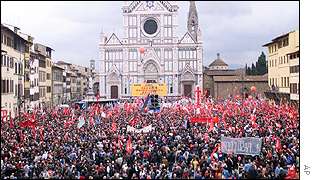
back

|
 |
Pension
plans prompt Italians to strike
By
Claire Soares, swissinfo
October 24, 2003

ROME
(Reuters) - Trains, planes, schools and even opera houses have been hit as
millions of Italians have staged a half-day strike against government
plans to raise the retirement age to ease pressure on the pension system.
Thousands of flag-waving protesters flooded into piazzas up and down the
country on Friday in the third storm of industrial action Prime Minister
Silvio Berlusconi has had to weather since he returned to power in 2001.
"If the government doesn't change its course and recognize the
strength of our arguments, they can expect us to continue our
protests," said Guglielmo Epifani, head of the largest union CGIL,
leading the march in the northern city of Bologna.
Like France and Germany, Italy is trying to reform its pensions system,
which swallows about 15 percent of gross domestic product. That proportion
is set to grow as low birth rates and longer life expectancy age the
country's population.
So the government wants to prevent Italians retiring before they have made
40 years of contributions or reached a minimum age of 65 for men and 60
for women. At the moment, Italians can retire at 57 if they have paid into
the system for 35 years.
"It's necessity that's forced us out into the streets," said
Marcello Cedroni, 83, clad in red and protesting in Rome's baroque Piazza
Navona. "I'm a pensioner and I'm finding it hard to survive now.
Under the new system, it will be even worse."
With the top three unions' 11 million members called to action, hospitals
said they could only guarantee staff for emergency services,
schoolchildren got a bonus day at home, and Milan's La Scala opera
cancelled its evening performance as its staff joined the walkout.
WAITING AT THE STATION
But it was travellers that bore the brunt. National airline Alitalia axed
more than 150 afternoon flights as a consequence of the staggered
four-hour strike and morning trains were cancelled, scuppering tourist
plans.
"What the hell is going on?" asked Kent Hedtke from the U.S.
state of Minnesota, whose European honeymoon came to a halt on the floor
of the Italian capital's main station.
"We were meant to go to Florence and we bought tickets from the
machine, but then it turned out no trains were running."
While many economists think Berlusconi's reforms do not go far enough,
unions argue that laws passed in 1995 are enough to avert a crisis and
accuse the government of churning out scare-mongering propaganda about
pensions to hide other "misguided" policies.
Although Berlusconi's first government in 1994 was toppled over the
pensions issue, his four-party coalition looked set to stand firm this
time, with Labor Minister Roberto Maroni dismissing the strike as "a
part-time protest".
The billionaire-businessman-turned-politician has had a mixed record
against the unions. In April 2002, he was hit by the first full-day work
stoppage in two decades as the country ground to a halt to protest labour
market reforms.
In the wake of that unrest, Berlusconi managed to split the unions, with
CISL and UIL accepting softer labour regulations to the fury of hardline
giant CGIL, which staged a one-day strike as it went it alone against the
government, but failed to secure further concessions.
Berlusconi may be irked that the unions have reunited around the
pensionís chestnut.
Copyright
© 2002 Global Action on Aging
Terms of Use | Privacy
Policy | Contact Us
|

